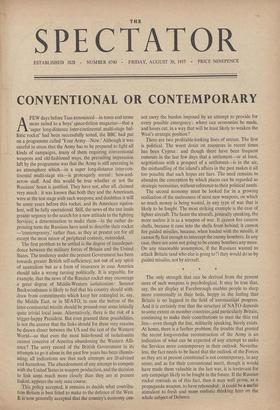CONVENTIONAL OR CONTEMPORARY
AFEW days before Tass announced—in tones and terms more suited to a boys' space-fiction magazine—that a `super long-distance inter-continental multi-stage bal- listic rocket' had been successfully tested, the BBC had put on a programme called 'Your Army—Now.' Although it was careful to stress that the Army has to be prepared to fight all kinds of campaigns, many of them requiring conventional weapons and old-fashioned ways, the prevailing impression left by the programme was that the Army is still operating in an atmosphere which—in a super long-distance inter-con- tinental multi-stage era—is grotesquely unreal : bow-and- arrow stuff. And this would be true whether or not the Russians' boast is justified. They have not, after all, claimed very much : it was known that both they and the Americans were at the test stage with such weapons; and doubtless it will be some years before this rocket, and its American equiva- lent, will be fully operational. Still, the news of the test lends greater urgency to the search for a new attitude to the fighting Services; a determination to make them—in the rather de- pressing term the Russians have used to describe their rocket =contemporary,' rather than, as they at present are for all except the most minor of peripheral, contests, outmoded.
The first problem to be settled is the degree of interdepen- dence between the military forces of Britain and the United States. The tendency under the present Government has been towards greater British self-sufficiency; not out of any spirit of neutralism but as a form of insurance in case America should take a wrong turning politically. It is arguable, for example, that the news of the Russian rocket may encourage a great degree of Middle-Western isolationism : Senator Backwoodsman is likely to feel that his country should with- draw from commitments which keep her entangled in, say, the Middle East, or in SEATO, in case the button of the inter-continental missile should be pressed over some initially quite trivial local issue. Alternatively, there is the risk of a trigger-happy President. But even granted these possibilities, is not the answer that the links should for these very reasons be drawn closer between the US and the rest of the Western World—so that even the most hide-bound of isolationists cannot conceive of America abandoning the Western Alli- ance? The sorry record of the British Government in its attempts to go it alone in the past few years has been illumin- ating; all indications are that such attempts are ill-advised and hazardous. The abandonment of any attempt to compete with the United States in weapon production, and the decision to link arms much more closely than they are at present linked, appears the only sane course.
This policy accepted, it remains to decide what contribu- tion Britain is best fitted to make to the defence of the West. It is now generally accepted that the country's economy can-
not carry the burden imposed by an attempt to provide for every possible emergency : where can economies be made, and losses cut, in a way that will be least likely to weaken the West's strategic position?
There are two profitable-looking lines of retreat. The first is political. The worst drain on resources in recent times has been Cyprus: and though there have been frequent rumours in the last few days that a settlement—or at least, negotiations with a prospect of a settlement—is in the air, the mishandling of the island's affairs in the past makes it all too possible that such hopes are liars. The need remains to abandon the conception by which places can be regarded as strategic necessities, without reference to their political needs.
The second economy must be looked for in a growing realisation of the uselessness of most new weapons, on which so much money is being wasted, in any type of war that is likely to be fought. The most striking example is the case of fighter aircraft. The faster the aircraft, generally speaking, the more useless it is as a weapon of war. It cannot fire cannon shells, because it runs into the shells from behind; it cannot fire guided missiles, because, when loaded with the missile, it cannot fly fast enough to intercept the enemybombers. In any case, there are soon not going to be enemy bombers any more. On any reasonable assumption, if the Russians wanted to attack Britain (and who else is going to?) they would do so by guided missiles, not by aircraft.
The only strength that can be derived from the present store of such weapons is psychological. It may be true that, say, the air display at Farnborough enables people to sleep more contentedly in their beds, happy in the feeling that Britain is no laggard in the field of 'aeronautical progress. And it is certainly true that the structure of NATO depends to some extent on member countries, and particularly Britain, continuing to make their contributions to man the thin red line—even though the line, militarily speaking, barely exists. At home, there is a further problem; the trouble that greeted the recent long-overdue reconstruction of the Army is an indication of what can be expected of any attempt to make the Services more contemporary in their outlook. Neverthe- less, the fact needs to be faced that the outlook of the Forces as they are at present constituted is not contemporary, in any sense; and as for their conventional merit, though it wouki have made them valuable in the last war, it is irrelevant for any campaign likely to be fought in the future. If the Russian rocket reminds us of this fact, then it may well prove, as a propaganda weapon, to have rebounded : it could be a useful stimulant to fresh and more realistic thinking here on the whole subject of Defence.






























 Previous page
Previous page